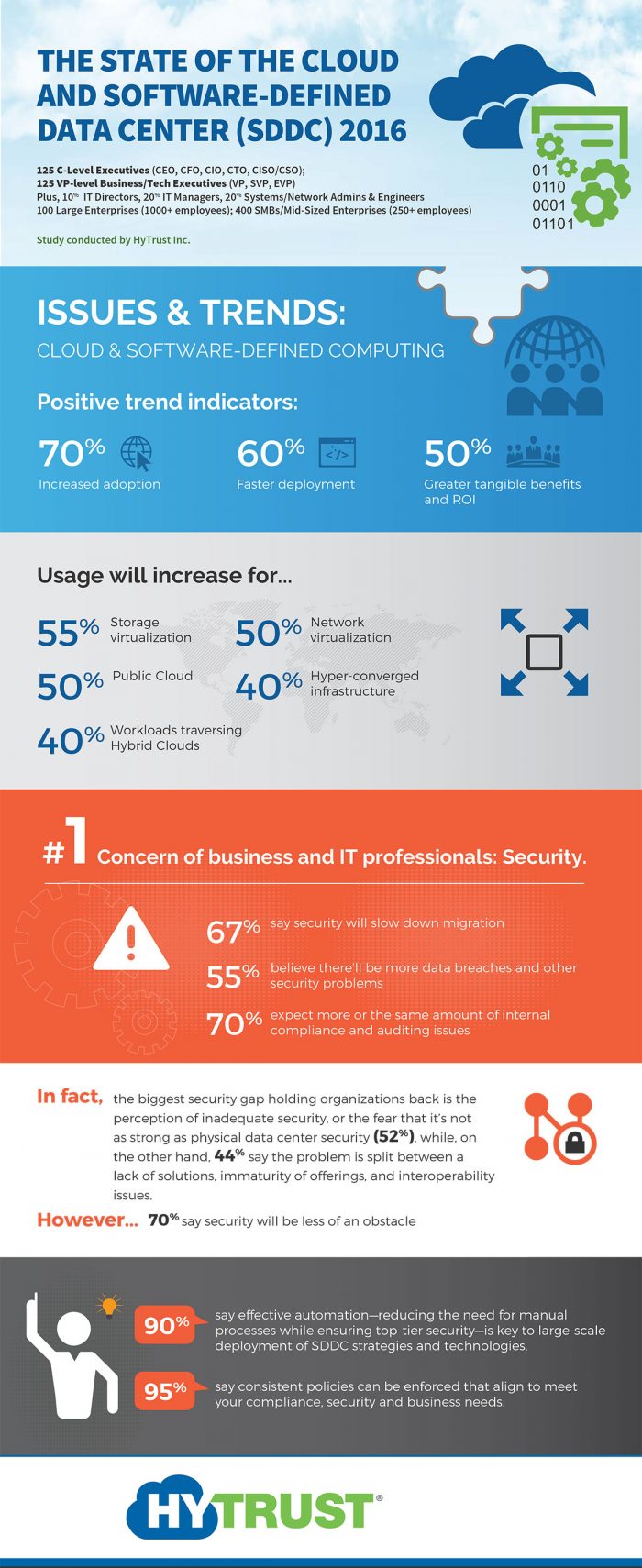In a research study by HyTrust, it’s apparent that adoption of public cloud services is accelerating in all verticals, and it’s not expected to slow down any time soon. Says Eric Chiu, president of HyTrust, “Without much fanfare, this critical technology advance has become woven into the basic fabric of organizations. The potential of virtualization and the cloud was always undeniable, but there was genuine concern over security and skepticism regarding the processes required. What we find in this research is that the challenges are being overcome, and every kind of function in every kind of industry is being migrated. There are some holdouts, to be sure, but they’re now the exception, and we’re betting they won’t stay that way for long.”
The business landscape is almost completely enmeshed with technology and its advances, many providing the tools and services to improve competitive performance, reduce operating costs, and improve productivity. Moreover, the spread of mobile and IoT solutions is encouraging business leaders to focus on new directions and implement radical new strategies. With Gartner’s predictions that 5 million people will have enterprise-confidential information on their smartwatches by 2018, and smartphone and wearables will be causing so much disruption by 2020 that organizations will have to implement restrictive policies, the increasing impact of technology on business is clear.
Correctly applied, the majority of businesses surveyed by HyTrust (Infographic source) believe that cloud and software-defined computing adoption will increase, offering faster deployment, and greater tangible benefits and ROI. Business and IT professionals do, however, hold security as the leading challenge, and the perceived lack of inadequate or robust security in cloud and software-defined data centers is considered the biggest deterrent to adoption. However, 70% of respondents believe that security will be less of an obstacle in the coming years. Many others also point to a lack of solutions, interoperability issues, and immaturity of offerings as limitations.

Migration to the public cloud is particularly evident in tech companies and business consulting and management firms, but they’re followed closely by emergency services, financial services, information and analytics services, energy and utilities, and education services. Concerns during migration, however, are prevalent with the risk of data breach, the necessity of infrastructure-wide security and control, and effective monitoring and visibility noted as the three top interests. Nevertheless, 75% of those surveyed plan to move workloads to the public cloud.

Cloud tools and services are popular with entrepreneurs, and studies by SCORE find that 92% use at least one cloud-based solution, while 52% employ cloud-based storage facilities. Cost-effectiveness, flexibility, ease of use, improved business agility, and security are the top five benefits observed. Unfortunately, many small business owners are overwhelmed with the number of technologies available, and though most recognize the value, only 29% use a customer relationship management (CRM) system. Security is, of course, not only a concern for big business, and in fact 60% of cyber crime attacks are against small businesses. Considering only 50% of those surveyed by SCORE protect their internet data, fewer than half have email security, and only one-fifth has network security encryption, better data security is an absolute must for progressive small businesses.
Virtualization increases the worth of physical server hardware, allowing businesses to do more with less at lower costs. Businesses can lower power usage, IT requirements, and space requirements, and spend less time on installation, maintenance, and support. Cloud computing also allows for greater integration, collaboration, and improved flexibility. Specialized services integrate with back-office operations, and the flexibility of cloud solutions could allow for cost-effective BYOD policies. Cloud computing makes collaboration much simpler and efficient, and the appropriate solutions also help control and manage data access. Though the range of solutions available is extensive and probably daunting for companies with small IT teams, cloud computing is an area worth spending time investigating.
By Jennifer Klostermann





